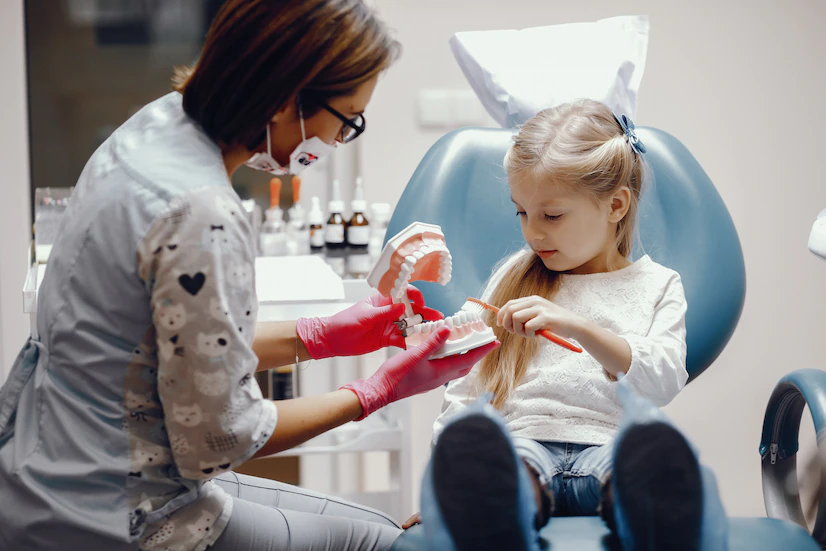During the first six months of life, children’s baby teeth begin to erupt. At age 6 or 7, they start to lose their primary teeth, and eventually, secondary, permanent teeth replace these teeth. Children who don’t receive the dental care they need may grow up with decay and mouth disorders that will cause them pain and other problems for the rest of their life.
Who Is A Pediatric Dentist?
Pediatric dentists are dedicated to kids’ dental health from early childhood through puberty. They have the education and experience required to look after a child’s teeth, gums, and mouth for the whole youth.
What Does A Pediatric Dentist Do?
Pediatric dentists provide the following services:
- Examinations of a child’s dental health that include a mother and child’s caries risk assessment
- Fluoride treatments, cleanings, and recommendations for nutrition and diet include preventive dental care.
- Habit coaching (for example, pacifier use and thumb sucking)
- Early evaluation and treatment for teeth straightening and bite correction (orthodontics)
- Repairing caries and other diseases
- Identify oral problems linked to diabetes, congenital heart defects, asthma, hay fever, and attention-deficit/hyperactivity disorder (ADHD).
- Management of gum illnesses and disorders, such as pediatric periodontal disease, short frenulum, mucoceles, and ulcers
- Attention to dental injuries (for example, fractured, displaced, or knocked-out teeth)
How Old Should My Child Be Before Her First Dental Appointment?
By age 12 months or within six months of the first tooth’s emergence, you should take your child to the pediatric dentist.
Benefits Of Early Dental Visits
- Children especially need to feel safe and at ease in unfamiliar environments. Early visits allow children to become accustomed to the dental office’s sights, sounds, and smells.
- Teaching children basic oral hygiene practices as soon as possible is crucial. Your child can learn how to use a toothbrush, how to floss, what a cavity is, and how to avoid one by going to the dentist. Good habits can be acquired early in childhood and last a lifetime.
- Children’s teeth are more vulnerable to deterioration. Pediatric dental care that is provided regularly can help stop tooth and gum decay. Detecting cavities in baby teeth is essential because neglecting them could result in later, more severe tooth problems. Early dental appointments enhance the likelihood that any growing dental issues will be caught early.
What To Expect From Your Child’s First Dental Visit?
The dentist will assess your child’s bite, check all of the child’s existing teeth for decay, and search for any potential abnormalities with the gums, jaw, and oral tissues throughout the examination. The dentist will clean teeth and determine whether fluoride is necessary. Additionally, they will review dental developmental difficulties, instruct parents on the fundamentals of oral health care for kids, and respond to any queries.
How Often Should A Child Go To The Dentist?
Children should visit the dentist every six months, just as adults. Some dentists might recommend more frequent appointments, such as every three months. The child may become more at ease and confident as a result.
Summary
Try to keep an eye on your child’s diet, brushing routine, and any discomfort or swelling they may be feeling in their mouth to help prevent repeated dental problems. Avoid sugary foods, especially before bed, and brush with fluoride-containing toothpaste at least twice daily. Additionally, as usual, make sure they are going to a pediatric dentist with experience who can maintain their oral hygiene and respond to any queries parents may have about good daily practices and dental hygiene.

